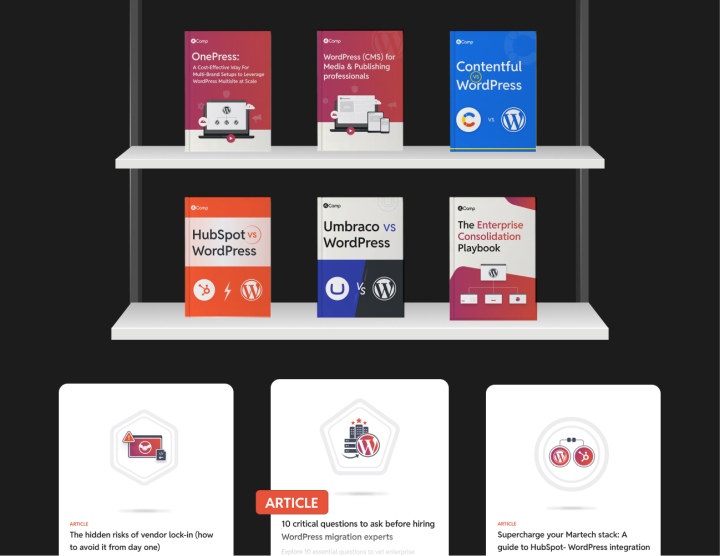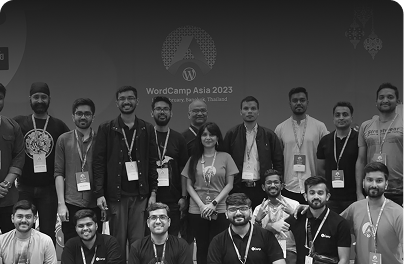Crafting high-performance websites with
Decoupled WordPress
services
We merge proactive front-end design with decoupled WordPress architecture for scalable, secure, high-performance web solutions.
What does rtCamp offer?
Decoupled web architecture:
Is it right for you?
Enhanced performance
By separating front-end display and back-end infrastructure, websites experience faster loading, smoother interactions, and reduced bottlenecks, leading to a more fluid and responsive user experience.
Optimized front-end development
With the front-end disentangled from the back-end, developers can leverage more technologies, frameworks, and tools that are optimal for the project at hand.
Improved content management
Decoupled architecture simplifies content changes, giving creators flexibility to modify content without affecting the back-end system, enabling a more dynamic and responsive content strategy.
Scalability assurance
Decoupled WordPress adapts better to high traffic websites and large databases. Our strategic approach includes preemptive scalability planning, ensuring website growth without compromising performance.
Robust security measures
rtCamp fortifies websites with stringent security protocols like SSH key access controls and containerized hosting, safeguarding data and systems from unauthorized access and breaches.
Guaranteed core web vitals
rtCamp consistently emphasizes superior core web vital scores for every project. We ensure every project complies with latest web standards to benefit SEO rankings and online visibility.
The rtCamp impact
Proactive front-end engineering
At rtCamp, every design undergoes a thorough feasibility evaluation to ensure that implementation is not only practical but also aligns with client expectations, leading to high-quality, pixel-perfect outcomes, even for the most complex projects.
Overcoming complex challenges
rtCamp has a track record of successfully navigating complex projects, from making websites mobile compatible under restrictive conditions to custom Gutenberg development to creating WordPress themes.
Commitment to security
At rtCamp, we follow stringent security protocols: exclusive SSH keys access, containerized hosting, constant monitoring and regular updates are default. We ensure your peace of mind by fortifying your digital infrastructure from threats.
Emphasis on performance
Performance isn’t a score, it’s a promise. rtCamp builds excellence by mastering Core Web Vitals, ensuring every user interface built is primed for excellence, ensuring your website maintains swift load times, responsive interactions, and stable functionality, even with traffic surges.
Scalability crafted into the architecture
rtCamp engineers proactively manage scalability through foresightful strategies like caching and query optimization, ensuring high-performance & resilient websites regardless of user load and data demands.
Expertise in tailored user experiences
Our decoupled architecture expertise crafts exceptionally performant websites, seamlessly merging advanced engineering with your brand’s unique identity, delivering a superior user experience.
Our tried and tested
tech stack
Content Management Systems (CMS)
WordPress: Utilized as a headless CMS, offering a familiar backend interface for content creators while serving content through RESTful APIs.
Front-end Technologies
React.js: JavaScript library used for building user interfaces, particularly for single-page applications that require a responsive and dynamic user experience.
Next.js: React-based framework to enable server-side rendering and static site generation for improved performance and SEO benefits.
Gatsby: Free and open-source framework based on React to build fast, secure, and powerful websites and apps.
JavaScript Frameworks
Node.js: Server-side JavaScript runtime environment to handle backend operations, ensuring smooth data retrieval and transmission in decoupled setups.
Authentication
JWT (JSON Web Tokens): Used for secure transmission of information between parties as a JSON object, crucial for authentication and information exchange in decoupled WordPress architectures.
Hosting and Containers
Easy Engine: Command-line tool for managing web servers, allowing efficient site creation, migration, and management in containerized hosting environments.
Docker: Containerization technology to package applications with their dependencies, ensuring consistency across multiple development, testing, and deployment environments.
Security Measures
SSH Keys: Used to secure encrypted communications between the server and clients for authentication and protecting sensitive data.
SSL Certificates: Used for secure data transfer over HTTPS, protecting data integrity, and providing client-server authentication
Performance Optimization
Advanced Caching Mechanisms: Used to enhance website performance, especially under high-traffic conditions.
CDN (Content Distribution Network): Distributes content globally and reduces latency, ensuring fast, uninterrupted access for users regardless of location.










